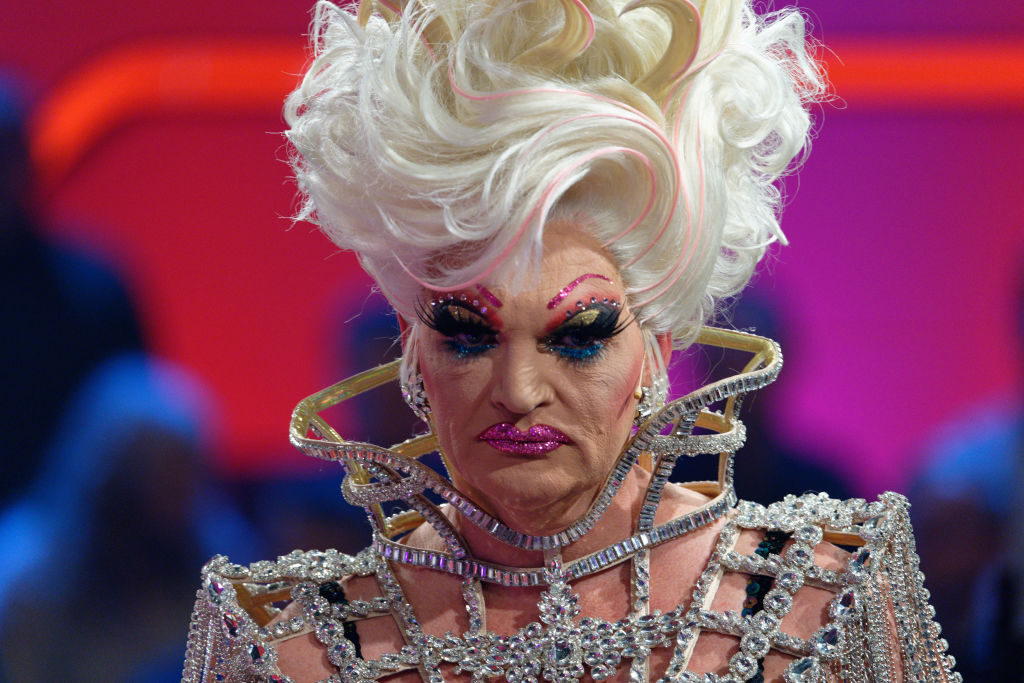Crisis fills the void left by meaning.
The Anti Boomers

How Gen Z split the Left.
As a selfless act of customer service, I addicted myself to TikTok. The client was a large sandwich chain. Its marketing department, like every marketing department, dreamt of breaking the internet with a totally rad viral TikTok campaign. Nothing forced. Something the kids actually want to share in a way that’s like, you know…organic.
They wanted to speak Gen Z, which they thought would be as easy as learning fluent Millennial. Pay off a recognizable athlete, tack on a buzzy cause, sprinkle in a rap lyric or two, take the weekend off. Just transpose it all from Twitter to TikTok. Little did they know.
So I laid on the couch and scrolled. And scrolled and scrolled. Two- and three-hour periods deaf and dumb to the world, phone sandwiched between my forefingers, right thumb flicking, eyes nystagmic. TikTok is a great thing to do hungover, or while waiting at the DMV. It’s perfect for submerging in a state of semi-consciousness.
Mostly, I laughed. Much harder than at anything I’d seen on TV in years. This was a surprise. If you want to know where sketch comedy—SNL, Anchorman, etc.—has gone, the answer is TikTok (and Instagram Reels, which is the same thing). The funniest sketch comedians in the world have taken their talents to the tiny screen. Brian Jordan Alvarez, Demarcus Shawn, Moschino Dorito, and Caitlin Reillybrought me to tears as in the days of Chris Farley. I was awed by their ability to recall details down to the slight bodily movements of some teacher they had—we all had—in grade school. Complex characters unpacked in seven seconds. Elaborate storylines told. Genuine, edgy cultural satire.
So why isn’t Brian Jordan Alvarez on TV? He’s got a deal or two, but that’s missing the point. He’s not on TV because TikTok comedy is better than sitcom comedy, which until recently had literal laugh tracks (blech). It feels like the peak of a new kind of art which better simulates the way we actually see and hear than any medium before it.
It’s oozing with the “anti-Millennial, anti-perfection” authenticity that all the strategists tell us defines Gen Z, which you can also see in “no-makeup” posts by, e.g., Julia Fox. But describing it as “authentic” sells it short. Fundamentally, it glorifies raw, simple human emotion. In this way, it’s less “authentic” than it is “genuine.” Of course, taken to its limit, this leads to nauseating displays of self-awareness, a word gunk of identities, personality traits, and disorders. But for every attack helicopter, there’s a real genius making mimetic art. Egregores like the Backrooms and Lil Miquela, or TikTok sounds like Mr. Jonson, elicit the truth of a certain hyperconnected experience that I’m not sure we’ve ever seen before, ever.
Trying to characterize it is pointless. Putting Gen Z’s language into words would be like a think piece on the sarcasm of Seinfeld. Exhausting and pointless: better to experience it yourself.
Because the beauty of the scroll evaporates when you look up from your phone and breathe the hostile air of reality. You’re frozen when scrolling, because your consciousness has entered the phone. You’re through the screen, nestled within the rectangular borders. Once you climb out, you try to explain it, but it doesn’t make sense.
So I came back to the table with simple, raw ideas—stuff like “flip challenge” Gen Z marketing master David Dobrik did for Chipotle. But to the minds of the Boomer/Gen X Hype Dads I was pitching to, these ideas made no sense. What do you mean it’s about the daily annoyances of the sandwich artist, and how exactly the mustard gets stuck in the tube? Where’s the BIG IDEA?
Boomers love BIG IDEAS, BIG MORALS, BIG BAD GUYS. The subtlety is lost on them. But Gen Z lives in subtlety. The way that one teacher, and therefore all teachers, jingles her keys during movie time.
Which brings me, finally, to my point. Boomers, Gen X, and even Millennials have been blindsided by the radical opinions of Gen Z, both far Left and far Right, because they think Gen Z is still digesting the same grand narrative as their forebears. But they aren’t. They’ve become unmoored. Their language is the fluid, implicit, and fractured meme-language of the scroll.
Moneyed Progressive Exceptionalism
That Gen Z was different became most evident after the Hamas attack on Israel on October 7. The last time this happened—in 2006, in the shadow of 9/11—not a single person said, “Hey, y’know, there’s two sides to this thing.” It was black and white, terror versus freedom. Millennials, bright-eyed and bushy-tailed true believers who’d taken school field trips to visit the Amistad, voted for Obama, and repeated plucky slogans about the power of higher education and world peace didn’t yet have the tools or tragedies to question their precooked narrative. They didn’t have a space to call their own.
But while we (Millennials) were putting our best foot forward on LinkedIn, Gen Z grew its own culture, truly cut off from the rest of us: an uncontrolled, Lord-of-the-Flies island culture with different values, different facts, and different stories, rooted in the American narrative of its parents but somehow warped and extended, governed by a sort of digital natural law. And because the Hype Dads have worshiped for so long at the fountains of youth and noble savagery, these Gen Zers—whose language is unintelligible to the vast majority of people—aren’t just participating in the conversation, they’re driving it.
When the news broke on October 7, I immediately thought of a family I’ll call the Friedmans.
In the highly progressive Chicago suburb of my youth, the Friedmans were your prototypical diaspora Ashkenazi Jews. This population comprises most of the people Americans think of as Jews: replicas of Jerry Seinfeld and Elaine Benes working as doctors, lawyers, bankers, and scientists. They’re culture people. They read the New Yorker, go to the theater, love Leonard Cohen, and have voted and donated blue since the 1960s, a period they worship with religious intensity. As for their actual religion, they generally consider themselves “cultural Jews”—meaning they go to the parties—without too much regard for the beliefs, and with very little regard for the morality. I learned this the hard way.
I generally found them to be good people—invested, family-focused, and politically liberal (which, growing up, stood in for righteousness in my mind). But then something happened that permanently changed my experience, both of them and of progressivism. It formed one of those early childhood memories, those loss-of-innocence moments where you realize adults aren’t necessarily the adults in the room. I still think about it all the time.
At the time I’d been hanging out with a lot of black kids. I vividly remember sitting alone in the backseat of the Friedman’s Camry with Sam Friedman, the dad, driving, and my friend, his son, riding shotgun. Somehow the topic of my black friends came up, and it was like the air got sucked out of the car. Sam’s demeanor went dark, and he spoke in a low but wry, almost mocking tone. He said, “These kids, they may seem like your friends, but they aren’t your friends.” I asked what he meant. “When you’re older, you won’t see them anymore.” I protested. “Trust me. You’ll see.”
The worst part? He was right.
But, being naturally repulsed by hypocrisy, I was shaken to the core. It was like peering into the bathroom and seeing someone peel off their human mask. How could this empathetic liberal, who spoke constantly of equality, justice, art, peace, love, who sent his kids to public school, gave to lefty causes, canonized MLK and glorified Jewish participation in the Selma march—how could this guy of all people truly believe that black people and white people can’t be friends?
I began to see exceptionalism everywhere. Not just among Jews, but among all affluent progressive whites in the Chicago area. Quiet, tongue-in-cheek, arm’s-length separation from the very black people they outwardly yearned to integrate with, all while their institutions increasingly ramped up the cleansing of straight white men. All this combined with a furious get-up-from-the-dinner table refusal to even engage in criticism of Israel.
It didn’t add up. How could they be so blind? Religious Jews, particularly Orthodox ones, seem to have a strong understanding of why antisemitism is consistent through history—not least because they’ve actually read the Torah, which is the same story all over again. But the “cultural Jews”—the majority donor class of Boomer Reform Jews with heavy influence on mainstream institutions—seemed completely unaware that the obvious next step after white counting is Jew counting. For them, Jewishness meant victimhood, and victimhood was currency. How could anyone ever think differently?
I saw how these opinions played out over the next two decades, a lot of it on Facebook, in those pre-Trump years when we still argued politics on our aunts’ and uncles’ feeds. Black people good/white people bad. Christian bad/gay good. Israel good/ISIS bad. Believe all Women/Trump has a tiny d*ck. I tried to warn them, but not only did they not listen: they reacted with emotional, atavistic disdain.
That is, until now.
Can’t Fool Them ANY of the Time
I thought of the Friedmans immediately after October 7 with, I’m ashamed to say, great excitement. I knew the hammer had finally dropped. We’d reached an inflection point in culture that the donor class could no longer ignore. Their hypocrisy would have to be laid bare. And I knew, as tragic as the events were, that what would follow was the first real fracture in the Left since before Trump.
And indeed, we see this fracture deeply damaging the Left’s patronage network. Money pipelines suddenly drying up. The Ivy League is a mess, can’t get its talking points straight, and is revealing itself more and more as the Race Marxism training ground it’s been for over a decade. The young people in the Biden Administration split from the pack and demanded a cease fire. Protests rage, and the media can’t decide whether they’re antisemitic violence or the righteous voice of the unheard.
The surveys are out. They tell us the majority of the kids believe Hamas should have an Israel-free state, and roughly a third of them don’t believe in the Holocaust. Commentators blame “the rise in anti-Semitism” on TikTok. They’re right, but not for the reason they think. The kids are having the same realization I had in that backseat, only 25 years delayed—and they’re having it on TikTok and because TikTok has a language that their elders can’t understand, let alone censor. Oh you say you care about the colonized, Dad? Let’s see how much you care. And then the next thing you know the 110 is halted by young Jewish idpolsheviks who put a menorah on the road like a traffic cone.
In the 1920s, Winston Churchill published an incredible short essay called “Zionism versus Bolshevism: The Struggle for the Soul of the Jewish People,” in which he argued more or less that without Zionism, Jews will inevitably turn to the destructive force of Communism: “Zionism,” he wrote, “offers the third sphere to the political conceptions of the Jewish race.” Without the structure provided by some sort of self-loving nationalism, without guidance toward the unified moral goal of self-preservation, the soul becomes magnetically drawn to the project of dismantling other nations, often your own. This isn’t just true of Jews, but of all people—especially young ones.
Boomers have a worldview with blindspots you could drive a truck through. Gen Z has a new language and a space to speak it that’s completely cut off from everyone above 25, let alone 65. Thus the older generations are finding themselves completely unequipped with any moral framework for responding to their natural rebellion. Boomers like the Friedmans toyed with race Communism, but of course they didn’t really mean it. I mean, come on: you thought we were serious? But they forgot to tell Gen Z, who took their public educations seriously.
This is why the split in the Left runs so clearly along age lines. We blame TikTok, but we’re blaming lava for the volcano. It’s not TikTok’s fault that, without healthy religion or nationalism, kids will gravitate toward dumb, naive, idealistic notions about the world (I should know: I was one). The fact is kids, Jews, everyone in the state of nature—digital or otherwise—is highly susceptible to the resentment-based worldview of the Communist, if they don’t have the immune system against it. The Boomers destroyed their immune system, indulged in an open hypocrisy that was totally unsatisfactory and transparent to their descendants, and created a generational perfect storm.
The globalist camp won’t recover from this fracture—not entirely. Its food source is irreparably damaged. More fractures will start to appear. Once it crumbles, the collapse will be faster than anyone thinks. We may hope that the brazen dishonesty and obvious dysfunction of the lizard Left will have people, young and old, running desperately back toward America.
The American Mind presents a range of perspectives. Views are writers’ own and do not necessarily represent those of The Claremont Institute.
The American Mind is a publication of the Claremont Institute, a non-profit 501(c)(3) organization, dedicated to restoring the principles of the American Founding to their rightful, preeminent authority in our national life. Interested in supporting our work? Gifts to the Claremont Institute are tax-deductible.
We have reached levels of cringe previously thought impossible.
A generation that wanted for nothing grows up to hate everything.
Angry young extremists are not going away or calming down. They are growing up.




